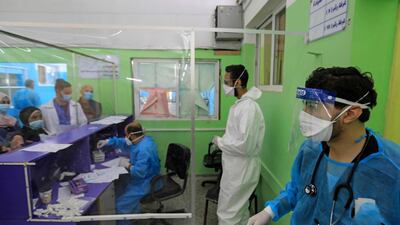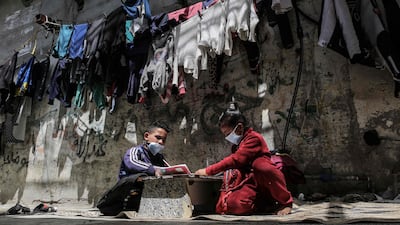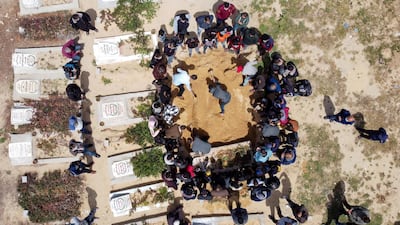Authorities in Gaza ordered schools to close on Wednesday, as Palestinians tackle a surge in coronavirus cases in the coastal enclave, with more than a third of tests returning positive.
In addition to closing nurseries, schools and universities until further notice, Gaza's Interior Ministry ordered a driving ban from Wednesday evening until Sunday morning.
"The crisis management unit has decided to impose additional preventive measures, to confront the high number of virus infections," the ministry's spokesman, Iyad Al Bazem, said in a statement on Tuesday.
The Health Ministry said almost 38.5 per cent of the latest tests conducted in Gaza were positive – 1,916 cases from 4,982 tests reported on Wednesday.
A month ago, less than 10 per cent of tests were returning positive, 169 out of 1,694 tests, according to March 7 figures.
Six people died from Covid-19 in the 24-hour period reported on Wednesday. This brings to 642 the total death toll, while Gaza has registered 75,375 cases during the pandemic.
The figures reflect a significant rise in infections in recent weeks, which prompted authorities to announce restrictions on April 1.
These included a 9pm curfew, the closure of weekly markets and wedding halls and a ban on gatherings.
The Interior Ministry said these measures will remain in place, while cautioning the rules may need to be tightened if the infection rate is not curbed.
Gaza’s two million residents escaped a coronavirus outbreak at the start of the pandemic, with anyone entering ordered to quarantine for three weeks.
Its first cases within the community were registered in August and the situation was brought under control, before a second outbreak in December prompted a lockdown.
The recent spread of coronavirus across Gaza comes after measures were relaxed, prompting an immediate increase in cases, according to the World Health Organisation.
“The situation is getting out of hand and this is clearly the effect of all the restrictions being eased,” said Sacha Bootsma, head of the WHO’s Gaza office.
An additional cause for the surge in infections may be the spread of new coronavirus variants, with 15 samples so far testing positive for a more transmissible variant first detected in the UK.
Only a handful of samples were sent to Ramallah to be tested for variants. Ms Bootsma said the WHO is "now looking into expanding the testing capacity for new variants in Gaza".
Gaza is currently carrying out both rapid tests and PCR tests, although equipment to conduct the latter is extremely expensive and capacity remains limited.
“The Ministry of Health only has one laboratory available where they can do the PCR test,” said Ms Bootsma.
“It’s also not a matter of buying more PCR machines, but staffing and the capacity to run these tests.”
While some places, such as neighbouring Israel, have seen infection rates plummet as vaccine drives get under way, less than 28,000 people have received a dose in Gaza.
The Palestinian enclave has so far received just 81,600 doses, the Health Ministry said, while negotiations are under way with donor states to secure more shots.
Palestinians are also part of the global Covax scheme, established to provide poorer countries with vaccines for 20 per cent of their population.
The programme has been hit by delays, however, with the first batch reaching the Palestinians in mid-March.
Israel, meanwhile, has administered vaccines to more than half its population of nine million.
The country has been criticised by rights groups for failing to expand its vaccination drive to Palestinians, limiting its involvement to donating a few thousand shots and vaccinating West Bank residents with Israeli work permits.
Dr Natalie Thurtle, from medical charity MSF, said if the vaccination drive is not ramped up, Gaza risks repeated coronavirus outbreaks over the next few months.
“Our key concern at this stage is the slow roll-out of vaccines,” said Dr Thurtle, MSF’s medical coordinator for Palestine.
"I think it's important to make the public health argument for Palestine's neighbours to support it with its vaccine roll-out, but also further afield for countries with a surplus of vaccines to try to help the entire world."
Coronavirus around the world: in pictures
















